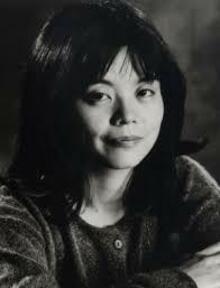On other languages - Natasha Wimmer in NYRB:
‘We first glimpse Hiruko, the protagonist of Yoko Tawada’s novel Scattered All Over the Earth, on a Danish television program about people whose countries no longer exist. She came to Denmark as a student, intending to stay for a year, but shortly before she was meant to go home her country—an unnamed archipelago located vaguely between China and Polynesia—disappeared. She speaks about this clearly and eloquently. Everyone understands what she says. But the language she’s speaking has never been heard before. “Tell me,” the host asks, “what is this language you’re speaking so fluently?” In Tawada’s curiously placid future world, no one is surprised that Hiruko can communicate in a language of her own making. The host is politely interested, and Knut, a self-styled linguist watching from home, is smitten—even aroused—by her mingling of grammars. She calls her personal language Panska, for Pan-Scandinavian, and she explains that she began to speak it because as an immigrant she was shuttled among Scandinavian countries: “no time to learn three different languages. might mix up. insufficient space in brain. so made new language.”’
(…)
‘Tawada has lived and worked between languages since she moved from Japan to West Germany in 1982, at the age of twenty-two. Her great love was Russian literature, which she studied as an undergraduate in Japan, but a move to the Soviet Union would have been complicated, so she availed herself of an internship in Hamburg, arranged by her bookseller father, and later enrolled at the university there. She was first published by a German press in 1987, and it wasn’t until four years later that she was published in Japan. Since then she has written in both German and Japanese, alternating from book to book and story to story. From the start, language itself has been a central preoccupation of her fiction. In her darkly surreal early books—full of folklore and dreams and humans morphing into animals—she is interested in language at its most elusive or incomprehensible.’
(…)
‘One of my favorites of her fictional experiments is the brilliantly absurd story “Saint George and the Translator,” from Facing the Bridge (2007), her second collection to appear in English. The protagonist is working on deadline from a borrowed house in the Canary Islands. “I’m translating a story from a foreign language into my own,” she explains with comical succinctness. Yet it doesn’t prove so simple. A friend advises: The trick is to read one sentence slowly while taking a deep breath, hold your breath while you translate the sentence in your head and rearrange the words, then, while carefully exhaling, write the translation down.’
(…)
‘Once Tenzo’s non-Japanese origins are revealed, Susanoo replaces him as the common object of pursuit. Older and more opaque than his posse of seekers, he is like someone out of an earlier Tawada book, a drifter whose wandering has left him in a darker place. When the friends finally track him to a sushi restaurant in Arles, Hiruko sits down with him at a table and eagerly pelts him with conversation in Japanese. When he fails to respond, she tries specific words that might spark an interest: “Yaritaikoto—I’ll bet that’s a word that takes you back.” Words contain the essence of their missing country, but the linguistic reunion so eagerly anticipated never comes about. Susanoo, it seems, has lost the power of speech—until at the very last he demonstrates a brand-new form of universal communication, one not tied to any particular country or language. The novel concludes with a moment of wordless expression, a step beyond even Panska in miraculous connection. The silence is at once empty and full of meaning, so long as we’re able to hold both possibilities in mind.’
Read the review here.
Rcently, Coetzee wrote a novel (or novella), ‘The Pole,’ where translation and world-English are on the foreground. See here.
The new and the old language are still on top of our lists.
Tawada (or maybe I should say Natasha Wimmer) gives us a description of English as lingua franca that is superb: ‘Everyone understands what she says. But the language she’s speaking has never been heard before.’
In times of voluntary cultural imperialism this is also a refelction on culture: new and utterly the same.
